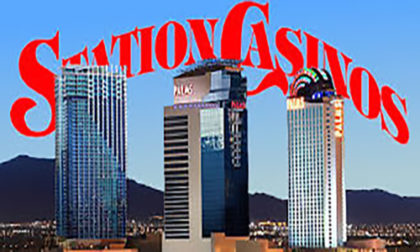January Ruling Expected in Station Casinos Bad-Beat Jackpot Dispute
Once in a while a curious poker story hits the virtual wires in such a way as to raise more questions than answer those that are already obvious. Such is the case with a feature run late in the week by the Las Vegas Review-Journal, in which a handful of cash-game poker players have filed a complaint against the Station Casinos chain in connection with a denied bad-beat-jackpot payout last July.
First the nuts and bolts of the story, as more or less can be deciphered from the LVRJ report. Last Tuesday, Nevada Gaming Commission officials conducted a special hearing into Station Casinos’ denial of a bad-beat jackpot payout to about 80 players who were at the designated BBJ tables at multiple Station casinos scattered around greater Las Vegas. The casino chain, popular with locals, runs a pooled BBJ that includes tables at all of its properties in one big BBJ pot.
That jackpot was hit, more or less, back on July 7th at Red Rock Station. In a hand that turned out not to collect the BBJ, 83-year-old Avi Shamir held the bottom end of a straight flush when the board was complete. while a rec player named Len Schreter had the top end of the straight flush. Both players must have held suited connectors with the three in-between cards that completed both straight flushes already on the board by the turn.
 According to the LVRJ story, the action was on Shamir when the river card was dealt, but Schreter, in his exuberance, slapped his nut straight flush onto the table, face up. Schreter certainly had the winning hand, but within roughly 15 minutes, according to the LVRJ, Red Rock Station management had invalidated the BBJ win. Given that in the meantime, the casino chain’s BBJ promo board had already started flashing, notifying players in all contributing Station rooms that the BBJ had been hit, this was… problem.
According to the LVRJ story, the action was on Shamir when the river card was dealt, but Schreter, in his exuberance, slapped his nut straight flush onto the table, face up. Schreter certainly had the winning hand, but within roughly 15 minutes, according to the LVRJ, Red Rock Station management had invalidated the BBJ win. Given that in the meantime, the casino chain’s BBJ promo board had already started flashing, notifying players in all contributing Station rooms that the BBJ had been hit, this was… problem.
Several players, including Shamir, filed the complaint against the casino, and in an earlier hearing, the NGC had ruled in the players’ favor. All the at-the-BBJ-table players across the Stations chain, more than 80 in total, were looking forward to divvying up various slices of about $120,000. About half of that, roughly $60,000, would have gone to Shamir.
Except Red Rock and Stations management appealed the NGC’s findings, for a reason which somehow went unreported in the LVRJ piece. What the story does report is that video surveillance clearly showed Schreter acting out of turn, showing his BBJ-busting hand.
The trickiest parts of the story are buried within the LVRJ piece. The piece duly includes a quote from one of the aggrieved and complaining players, Michael Bluestein. Bluestein wasn’t actually in the hand — or even in the casino — but he was still purportedly in line for a few hundred dollars of payout, since he was seated at a Santa Fe Station BBJ table when the hand at Red Rock occurred.
Said Bluestein, “It’s pure greed. They don’t care about locals. They say they do, but they don’t.”
The LVRJ piece than dismisses Bluestein’s beef by noting that the BBJ is paid for by a drop collected over time from all participating tables. Except that’s not the full and proper reasoning, either; Bluestein is partly right, but a communication gap keeps the story from getting out in full to most readers.
Bad-beat jackpots slowly build up in time due to drop collected from participating tables. In the pooled Stations offering, that drop is $1 per hand, which is very typical. BBJs can reach tens or even hundreds of thousands of dollars before they’re hit, and it appears the minimum needed was aces over… something, probably jacks. There can also be a disconnect between what it takes to crack the jackpot and how much it actually contains. BBJs operate something like lotteries, in that the larger the payout, relative to the perceived odds of doing the cracking, then the more people will play them.
That’s an important and missing detail; if the posted BBJ amount was indeed large enough to cause a little bit of locals-flavored stir, then there’s more truth to Bluestein’s assertion. There’s a huge difference between a BBJ that needs -just- aces over jacks to be cracked, as opposed to something like quad sevens. (And for those who are interested, here’s a link to a 2010 version of Stations’ BBJ rules.)
Anyhow, the money in the BBJ as it exists at any point in time is already predetermined. Whatever portion is reserved as seed money for the next BBJ cycle doesn’t change the fact that eventually, the money is paid out in accordance with pre-established jackpot rules. (This update corrects previous information — hh.)
And with this missing information in hand, we can now return to the disputed BBJ hand involving Shamir and Schreter. We as readers know that Schreter acted out of turn after the river card was dealt. What we don’t know is if both players were already all in at that point.
If either player was all in and the other had called, noting that this action likely would have occurred on the river, than Schreter’s out-of-turn exposure was moot. However, — and this is despite the initial NGC ruling, which noted an unintentional error by Schreter — there were probably still chips available to be bet by both players. It’s the only scenario under which any form of game play could still occur.
So, Schreter was in position, and he denied Shamir the chance to make a losing bet by exposing his own better straight flush. This is what Stations management termed as rules-breaking communications between players while the hand was still live, and why they denied the BBJ payout.
The problem with that is that it denies the payout to Shamir and all the other BBJ pool participants through no fault of their own. Schreter’s premature exposure of his cards hurt only himself, not counting the looming BBJ payout. That’s why the players have taken the matter to the NGC. That agency will issue a ruling in the matter next month, though Stations could still file a legal appeal should the chain again lose in the decision.
The disconnect, never really explained in the LVRJ piece, is why should the casino even care. After all, the $1 drop for the hand has already been collected, right? The answer can only be what was surmised above: The BBJ amount had swollen well beyond its normal range, and it was helping drive additional traffic to tables all across the Stations chain.
This is utterly missing from most reports on the dispute, but it’s the balancing part of the story; Stations may be fighting based on a strict interpretation of its rules, but it’s also important that the NGC already ruled once in favor of the players. There’s no real reason for Stations to keep fighting unless there’s a significant amount of temporary poker traffic at stake.
Personally, chasing a bad-beat jackpot isn’t the best choice, in terms of return on investment. That tiny little bit of drop every hand adds up over time. And then, if you think you’ve finally hit it and it turns out not to be true, well that’s a bad beat, indeed.




















COMMENTS